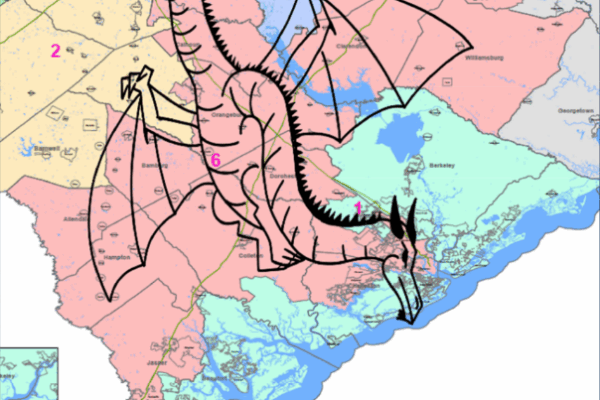Last week, the US District Court ruled that South Carolina’s first congressional district is racially gerrymandered and must be redrawn.
How we got here:
In December 2021, the SC Legislature adopted a new electoral map. This process, called redistricting, is done every 10 years following the US Census. While it’s normal to see some changes, this map made some big changes several districts.
After seeing the maps, ACLU of SC joined our partners and filed suit in federal court on behalf of the South Carolina State Conference of the NAACP and an individual voter, Taiwan Scott. We believed the South Carolina Legislature engineered its new redistricting map to pack and crack Black communities and suppress Black voting power, and we were prepared to fight it in court.
In the fall of 2022, the case went to trial. We argued before a three-judge panel that the redistricting plan reaches into the cities of Charleston, Columbia, and Sumter to extract dense populations of Black voters from their surrounding communities to ensure that only CD6—and no other district—is competitive for Black-preferred candidates.
Last week, the Court ruled in our favor, finding that the General Assembly’s changes to CD1—particularly in Charleston—“made a mockery of traditional redistricting principles.” Read the opinion here.
What to know:
This ruling is a victory for all South Carolina voters. We deserve to make our voices heard by voting in fairly drawn districts.
Rulings like this come about because cases are filed on behalf of plaintiffs who are willing to take a stand in a public forum. That’s a courageous thing to do, and we are grateful to the South Carolina NAACP and Taiwan Scott for fighting on behalf of Black voters.
Concerted efforts to minimize the political power of Black voters aren’t new, and this ruling is a huge win for Black voters.
Plaintiff Taiwan Scott said, “For decades, South Carolina has tried to push Black voters out of the electoral process and effectively silence us with maps that dilute our political power. Today’s decision finally recognizes this egregious, generations-long effort to box us out of representation. While there is still a lot of work to be done, we are one step closer to rectifying South Carolina's long history of voter suppression, and one step closer to the representation we deserve.”
What’s next:
The court has ordered state legislators to redraw its electoral map by March 31, 2023. And we’ll certainly be watching. Until they’re redrawn, there can be no elections in Congressional District One.
The State can appeal this ruling, and if they do, we’re ready to take this fight to the United States Supreme Court.
Fights like this one for voting rights are marathons, not sprints. This ruling is the result of more than a year of work by our entire legal team, joined by the American Civil Liberties Union, Legal Defense Fund (LDF), University of Maryland Law Professor Chris Bryant, Arnold & Porter, and General Counsel’s Office of the NAACP, on behalf of our clients, the South Carolina NAACP and Mr. Scott.

